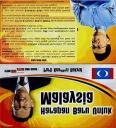skip to main |
skip to sidebar
Malaysia's former deputy prime minister Anwar Ibrahim, yesterday won £660,000 in libel damages against an author whose allegations of sexual impropriety and incompetence played a large part in his downfall in 1998.
Judge Hishamudin Yunus said there was no substance to the book - 50 Reasons Why Anwar Cannot Be PM, written by Khalid Jafri and his wife, Rozihan - and that its publication was designed to destroy the plaintiff's career.
Mr Anwar, freed this year after serving six years for corruption and having his sodomy conviction quashed, is unlikely to see much of the cash since Mr Khalid is seriously ill in hospital. But he said yesterday: "I am vindicated ... it is a matter of honour and truth."
Mr Khalid has been sentenced to a year's jail for publishing false statements but is free pending appeal.(picked from http://www.guardian.co.uk/world/2005/aug/19/johnaglionby by John Aglionby The Guardian, Friday August 19 2005)
by Simon Tisdall
The Guardian,
Tuesday May 31 2005Anwar Ibrahim, Malaysia's leading opposition figure, launched a series of rallies and speeches across the country at the weekend - but you would not know it from reading the newspapers.
An establishment politician turned pro-democracy "icon" who was beaten and jailed by the government of the former prime minister Mahathir Mohamad, Anwar drew an estimated crowd of 10,000 people in Penang. Up to 40,000 were expected in northern Kedah yesterday.
But most Malaysians are unaware of Anwar's travelling reform campaign. The media blackout is total. Officially, he is Malaysia's invisible man.
Interviewed at his home in Kuala Lumpur, Anwar said Abdullah Ahmad Badawi, Dr Mahathir's successor, had ordered the gag.
"Editors tell me it is the personal instruction of the prime minister that you should not report or mention Anwar at all," he said.
Various reasons had been given, all of them preposterous, he said. "I'm a threat to the nation, a threat to security, I will split the Malays ... Actually, they don't try to justify it. It's brute force."
Editors would be quietly removed, advertising withdrawn, or publishing licences withheld if newspapers disobeyed. That was typical of the roundabout way repression worked in Malaysia, he suggested.
Leaders of Umno, the main ruling party, say that Anwar, who was deputy prime minister and heir apparent before an explosive falling-out in 1998, no longer matters.
But such indifference hardly squares with tight restrictions on his political activities, media gags, continuous surveillance - and the big turnouts for the "illegal" rallies organised, by word of mouth, by his People's Justice party (PKR), led by his wife, Wan Azizah Wan Ismail.
The PKR is pushing for tougher anti-corruption measures, economic and electoral reforms, an end to detention without charge, judicial and media independence, and a reversal of institutionalised workplace and educational discrimination against Chinese and Indian minorities.
Western governments that criticised Anwar's trial view current tensions as an internal matter. A diplomat said it was misleading to see him as "some sort of white knight" and pointed to inconsistencies between his present stance and his time in office.
But such attitudes were another example of denial, Anwar said. "People in the west say Malaysia is a moderate Islamic country, there are no bombings, it's a democracy. And they are fearful of the Islamic parties. So they think it is safer to deal with Umno.
"But how do you have moderation and democracy when there are no basic rights? This is a very repressive system but repressive mostly without violence. It is civilised repression. It was learned from the British."
Corruption was endemic, unemployment was rising, police abuses went unchecked, foreign investment was declining and the country's democratic institutions, dominated by Umno since independence, were dangerously weak, he said. Without reforms, Malaysia could become all the things the west most feared.
Some Malaysians believe Anwar blew his chances in 1998. Others are waiting for him to emerge from the shadows. He is exploring a common platform with opposition and Islamic groups. He still has allies inside Umno and among Malaysia's numerous royal families.
But the road back after six years in jail and a current period of recuperation and study in the US and Britain will be tough.
"He's in a weak position right now," a western diplomatic source said. "He is well aware that if he wants to come back to power, he can only do so through Umno."
Beyond the haze of official harassment and obfuscation, two things seem clear. One is that given a level playing field, Anwar can still hope to lead his country one day. The second is that Malaysia will eventually be forced to embrace the reformasi agenda he espouses.
The question is whether he is up for a fight that could lead him back to jail, to a deal with ruling party modernisers or to a Ukraine-style popular insurgency before the 2008 election.
"He's our hero," said Amien Rais, a leader of Indonesia's 1998 democratic constitutional revolution. "I hope in three or four years we will see him in a different position."
Anwar vows to return. "I am a Malaysian. This is my home," he told supporters in Kuala Lumpur on Sunday. "I shall be back."
